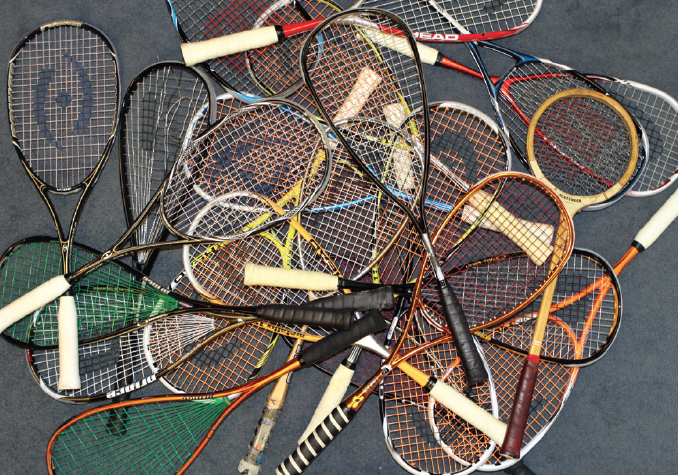
By Richard Millman, Owner – The Squash Doctor Corporation
A racquet is simply an implement to allow you to direct and control the ball in such a way that you can facilitate your own movement into a ready position from which to be able to hunt your opponent’s next shot. As such it must both transmit and receive the clearest possible signals from the racquet face to the brain, and vice-versa. Any interference with those messages is undesirable and will both limit and confuse the clarity of the picture in your mind and, therefore, the control of the ball that you are able to exert.
Therefore, you had better be holding something that gives you both control and feel—or you are going to be operating blind!
As squash players we are all unique (thank God!), which is part of what makes our sport such a fascinating battle of assets—power versus touch, speed versus strength, stamina versus agility and, indeed, any combination of these.
When you need a new racquet, your first concern should be that you can wield it without it interfering with your physical ability to strike the ball at the moment you want to strike it. If the weight and/or balance of the racquet seems to be fighting you as you swing, chances are it’s the wrong racquet for you. An easy test is to waggle’ the racquet back and forth using just your forearm, wrist, hand and fingers. If you feel that the racquet moves easily in rhythm with your movement, without straining your hand, then this might well be a racquet for you. If, on the other hand, the weight/balance of the racquet seems to ‘fight’ your movements, then you probably have the wrong bat.
Style and technique do contribute to choice of racquet. I have often found that converted tennis players like a heavier racquet that has a ‘mid’ or even head-light balance, as they tend not to use their wrists to the same degree as squash players who have grown up only playing squash.
On the other hand, converted badminton players will often prefer a very light frame with more of a head-heavy balance—allowing them greater dexterity for their wrist action.
Among squash players that have not played other racquet sports, I find mid-to slightly head-heavy frames with a little more weight than the lightest (120 gram) racquets are most popular and, more importantly, most effective. Weights in the range of 140-160 grams seem to offer the greatest combination of both sensitivity and power. Anything over 170g is unlikely to give most people the comfort they are looking for. If in doubt, give it the ‘waggle’ test. Too much strain means it’s not the right frame.
However, there are exceptions to this rule and occasionally we find incredible control from players using very heavy racquets and, equally, a few really powerful players using very light, head-light balances. These people do tend to be the exception.
The best source of advice is always likely to be your club pro. The racquet the pro uses isn’t guaranteed to be the perfect racquet for you, but since he is using it, it probably isn’t a bad place to start.
Ask your pro to come on court with you and have him/her feed you while watching you strike some forehands and backhands with the racquets you are choosing from. In my experience, the pro can tell you within a few hits which racquet suits you best. Buy your racquet from your club pro and you will have the security of after-sales service in the case of a faulty racquet. Also, the pro will often string the racquet to your liking.
Please don’t go to big national chains and buy a racquet based on price. It is almost guaranteed to be a disaster. As soon as you hand it to your coach, you are likely to be told that it is way too heavy for you. There are exceptions to this and you might get lucky. But why take the chance?
If you don’t have a pro, ask some of the better players to let you have a hit with their racquets and find out what suits you the best. Then order your racquet from a reputable online dealer, but check what their after-sales policy is. The best ones are more interested in their customers and their reputations and will give you reassurances about what treatment you will get— not just be trying to make a quick sale.
Overall, the stick you choose will determine much about the way you play. Choosing it with the advice of your coach or experienced friends will pay off big time. The advice I have given here should be taken as a guide and a starting point to show you what to look for and why. Make your final choice ‘hands-on’ with someone you trust. Good hunting and ‘waggle’ carefully!





